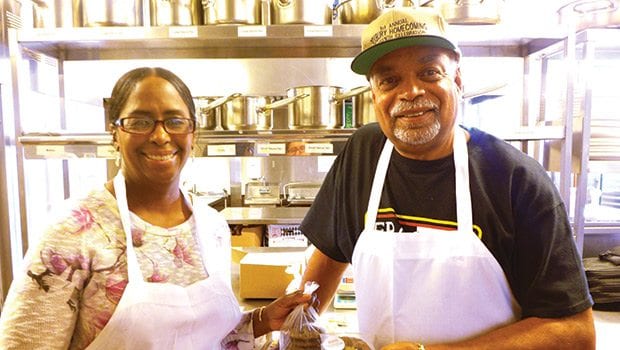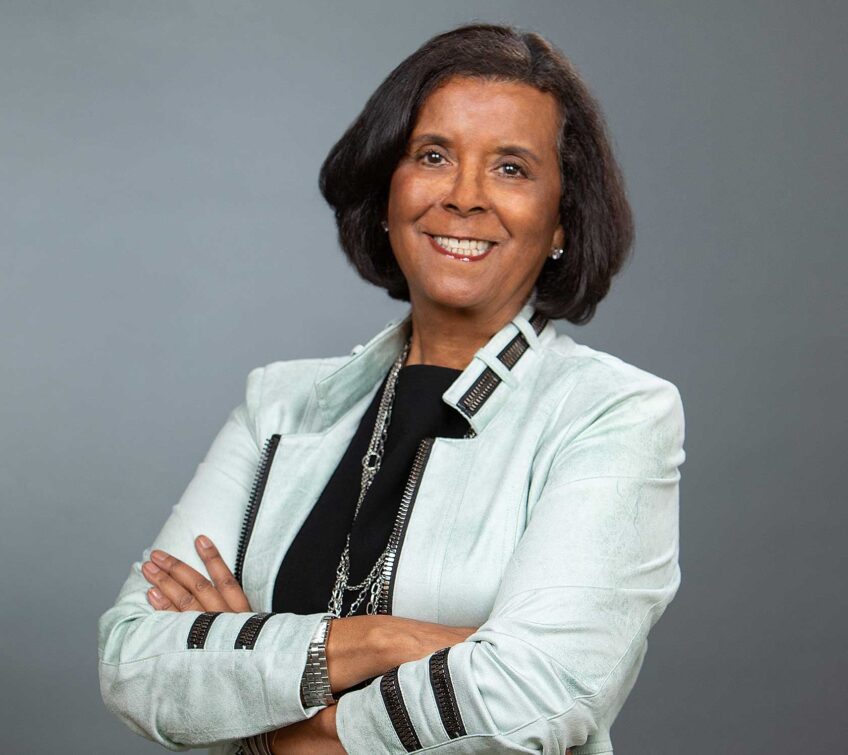Small baker aims big
Healthy baking company sets sights on government catering contracts

Small business owner Tonya Claire Johnson aims for a big change.
Johnson is one-half of the two-person duo behind Ancient Bakers, serving as owner and baker. Alongside her is Richard Peters, who focuses on sales and recruiting customers. Their mission is to create healthy — but still delicious — baked goods. They advertise dairy-, egg- and peanut-free treats that also are low in gluten, sodium and cholesterol. Their Shopify page declares they only use “ancient grains and medicinal plants once revered by our ancestors.”
Johnson and Peters spend nearly every weekend and evening working in the kitchens of New England Center for Arts and Technology, where Johnson bakes up vegan cookies, muffins, pastries and cakes using fair trade ingredients. Their weekly schedule packs in several farmers’ market appearances and occasional food festivals, caterings and food shows. Sometimes baking students from NECAT join them for internships, or a family member lends a hand.
In a typical month, Ancient Bakers makes a couple thousand cookies and 100-200 muffins. One summer, a catering contract had them making 7,000 cookies a month.
After more than a decade baking healthy treats, Johnson knows well that making a cake rise is one thing, but getting a business to rise involves a whole other skill set. To develop that, she got her MBA from Simmons School of Management and still attends financial and business planning workshops. Ancient Bakers sells primarily in small venues, but to make their business truly sustainable, they have set their sights higher. Their goal is to secure long-term government contracts for food provision.
Diving into business
“I had thought you could sell these products the same way you sell Tastykakes … that’s not true. It begged for a new model,” said Johnson. So, she went to business school to learn how to develop that model.
“[We] locked arms and jumped back in”, said Johnson. She dissolved Ancient Bakers (then called Vision’s Sown) in 2007, but re-incorporated it in 2008. In 2009, Peters joined, bringing new energy.
Though the company was founded in 2002, a serious push did not forward did not occur until 2010.
The duo rented space at CropCircle Kitchen, a share-use kitchen that also provides training and support for young, growing businesses. Soon after, they brought their products — at that point just two types of almond butter cookies — to show at the two-day Boston Vegetarian Food Fest.
Through CropCircle and networking with industry insiders, Johnson and Peters learned of opportunities to bring tastings and share their company’s vision at various food shows.
Farmers’ markets have been especially useful in winning new customers, garnering attention and attracting invitations from food show managers. Ancient Bakers recently was invited to a Beth Israel Health Fair by a representative who sampled their product at a farmers’ market.
Edible magazine featured them in a Spring 2015 article, which raised their visibility and sparked calls from a number of farmers’ markets all over.
Small stores, big risks
Ancient Bakers previously sold its products in small stores such as Jamaica Plain’s City Feed & Supply, but they dropped that practice in 2013.
“There’s a lot of volatility in retail,” said Johnson, who believes that mode of selling remains too unpredictable for a business seeking to grow.
When selling to small stores, Ancient Bakers had no guarantee that sales would continue. If the store ran low on shelf space or if a competitor came in, sales could abruptly dry up, Johnson said.

Some students at the Center have gone on to intern with Ancient Bakers.
Contract for a future
Johnson’s goal is to land multiyear, overlapping government contracts to supply food for groups such as veteran’s hospitals, prisons, and military bases. This would assure her of a reliable sales stream.
Johnson said that in hospitals, “There’s a big need for foods that are egg-free, dairy-free, low cholesterol, low-sodium, and heart-healthy.”
Given its scale, the government also can afford to pay enough to off-set food costs — an issue Johnson has confronted in the past. Last summer, Ancient Bakers secured a contract to provide food for summer camp lunches under the City Fresh program, but had to offer their goods at a deep discount.
“Price points that those contracts were able to pay were so low that … we gave the quality, [but] we lost money,” said Peters.
Ancient Bakers’ status as a small and minority- and woman- owned business also gives it access to a percent of federal and state contracts that prioritize vendors fitting that profile. This year, they are pursing baking and catering opportunities at the state level as calls for proposals are announced.
Seeking SBA certification
The Small Business Administration offers a nine-year Business Development program for businesses that, like Ancient Bakers, are primarily owned and run by minorities. A company granted entrance into the program receives preferred access to some contracts and is offered mentoring, business planning help, and other assistance to develop the business with the intention that once it leaves the program it will be able to compete independently in the market.
Quest for capital
“Food is a cash-intensive business,” said Johnson, who has had difficulty attracting big investors.
In order to fulfill the volume and create the sales levels that would attract major investors, Ancient Bakers would first need an infusion of capital to fund the ingredients, equipment and licensing costs entailed by those orders. It is a Catch-22, said Johnson.
The biggest costs for the business are ingredients and the regulatory fees, such as annual license renewal, insurance and renting kitchen space. While Ancient Bakers satisfies state and city food standards, if Johnson wants to apply for federal contracts and work with major food services companies, she will need to also meet Food Safety & Modernization Act standards and pass a Good Manufacturing Practices Audit. This means moving into a new facility that meets all of the requirements, which range from a security system to metal detectors for scanning the finished food products.
Inspiration close to the heart
Learning business has been a necessity, but the baking has come straight from the heart.
Johnson’s mother was a master of the kitchen, canning, baking and cooking. Johnson grew up learning from her. As an adult, she became a vegetarian and spent time working at a health food stores. This prompted her to question, “How do I have the great things my mother used to fix…but are healthier?”
Johnson came to Boston for pre-med at Harvard Extension, with the plan of then moving to Seattle to study naturopathic medicine. But her plans changed with the birth of her son, whose many food allergies caused him to suffer from acute malnutrition. She dived into research and with her mother experimented to find alternatives to the ingredients that triggered her son’s allergies. At last they devised recipes her son could eat and enjoy.
“You see it [malnutrition] on TV…but you don’t hear the cries from them,” Johnson spoke of the heart-wrenching experience watching her son suffer and years of hospital visits. “That was what pushed me into really figuring it [the bakery] out.”
From there she sought to bring her new doctrine of cooking to a broader audience.
Dessert the doctor ordered
When considering how to enhance their business, one thing Ancient Bakers’ team knows they do not need to worry about is the recipes.
At farmers markets, Peters will dive into the pitch, explaining all the health benefits of their cookies. Then he will add, “who cares about that [the health] if the product doesn’t taste good?” He follows this up with tastings that, they say win over many.
One of Ancient Bakers’ most popular specialties is their Ancient Oatmeal cookie. The cookie is dense without being heavy and it features a rich molasses note and a well-balanced flavor. To taste, one might think the treat is full-butter, but there’s a lot more going on beneath the cookie’s surface.
According to the product catalog, the recipe boasts a variety of ingredients that offer an extra health boost, and the company site emphasizes all the baked goods are “nutrient rich.” The oatmeal cookie’s organic flax, states the catalog, provides “plant-based omega 3s”, the Earth Balance Buttery Spread gives “heart healthy essential fats” and that organic oats are “proving to be key to longevity.”
Repeatedly Johnson has tested her thesis that plant-based ingredients can replace dairy and eggs, without sacrificing taste. In her 14 years of baking, she stated she has yet to find competition in the healthy bakery niche. “Our ingredient system is our competitive advantage,” she said.
Next steps
Ancient Bakers is looking for a new location, where they will have room to produce in higher volumes and to implement the system changes they need to meet federal food safety requirements.
As they work toward larger contracts, they remain on the lookout for the next opportunity to spread the word, and taste, of healthy baking. A recent pilot involves participating in Berkshire Farms’ “farm to flight” marketplace in Logan Airport. Ancient Bakers also is exploring new farmers’ markets to add to their current schedule and will be attending winter markets.






